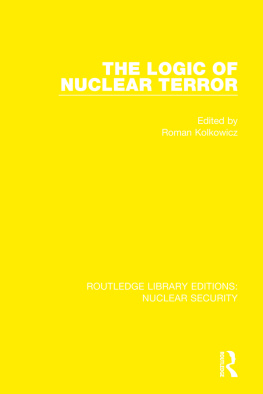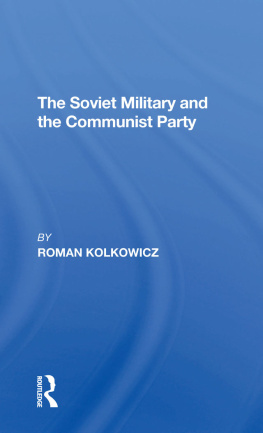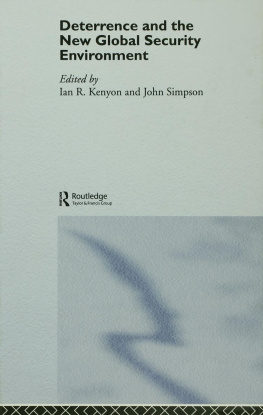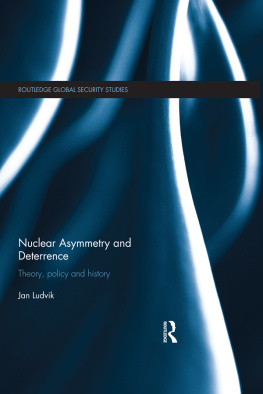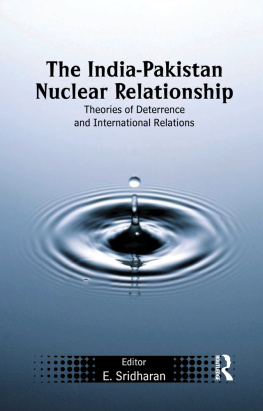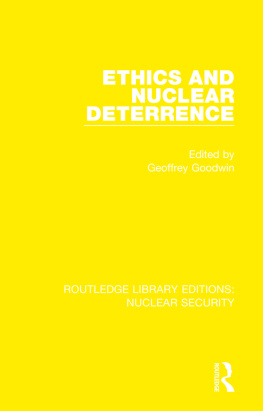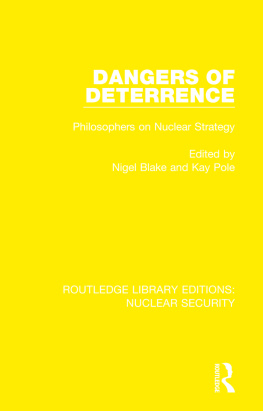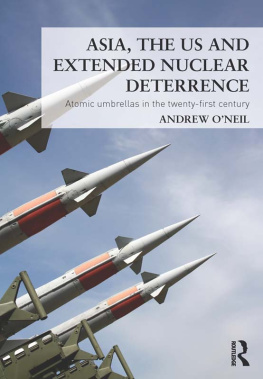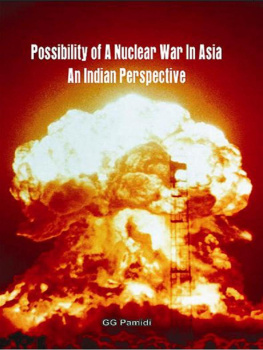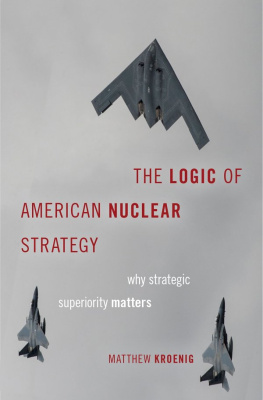ROUTLEDGE LIBRARY EDITIONS: NUCLEAR SECURITY
Volume 28
THE LOGIC OF NUCLEAR TERROR
First published in 1987 by Allen & Unwin, Inc.
This edition first published in 2021
by Routledge
2 Park Square, Milton Park, Abingdon, Oxon OX14 4RN
and by Routledge
52 Vanderbilt Avenue, New York, NY 10017
Routledge is an imprint of the Taylor & Francis Group, an informa business
1987 by Allen & Unwin, Inc.
All rights reserved. No part of this book may be reprinted or reproduced or utilised in any form or by any electronic, mechanical, or other means, now known or hereafter invented, including photocopying and recording, or in any information storage or retrieval system, without permission in writing from the publishers.
Trademark notice: Product or corporate names may be trademarks or registered trademarks, and are used only for identification and explanation without intent to infringe.
British Library Cataloguing in Publication Data
A catalogue record for this book is available from the British Library
ISBN: 978-0-367-50682-7 (Set)
ISBN: 978-1-00-309763-1 (Set) (ebk)
ISBN: 978-0-367-53245-1 (Volume 28) (hbk)
ISBN: 978-1-00-308111-1 (Volume 28) (ebk)
Publishers Note
The publisher has gone to great lengths to ensure the quality of this reprint but points out that some imperfections in the original copies may be apparent.
Disclaimer
The publisher has made every effort to trace copyright holders and would welcome correspondence from those they have been unable to trace.
ROMAN KOLKOWICZ, Editor
The Logic of Nuclear Terror
Published under the auspices of
The University of California Project on Politics and War
Copyright 1987 by Allen & Unwin, Inc.
All rights reserved.
Allen & Unwin, Inc.
8 Winchester Place, Winchester, MA 01890, USA
The U.S. Company of
Unwin Hyman Ltd,
P.O. Box 18, Park Lane, Hemel Hempstead, Herts HP2 4TE, UK
40 Museum Street, London WC1A 1LU, UK
37/39 Queen Elizabeth Street, London, SE1 2QB, UK
Allen & Unwin Australia Pty Ltd,
8 Napier Street, North Sydney, NSW 2060, Australia
Allen & Unwin (New Zealand) Ltd, in association with the Port Nicholson Press Ltd
Private Bag, Wellington, New Zealand
Library of Congress Cataloging-in-Publication Data
Kolkowicz, Roman.
The logic of nuclear terror.
Includes bibliographies and index.
1. Nuclear warfareCongresses. I. Title.
U263.K65 1987 355.0217 8622317
ISBN 0044970315
ISBN 0044970323 (pbk.)
British Libraiy Cataloguing in Publication Data
The logic of nuclear terror.
1. Nuclear warfare 2. Strategy
I. Kolkowicz, Roman
355.430701 U263
ISBN 0044970315
ISBN 0044970323 Pbk
Manufactured in the United States of America
For my daughters
SUSAN, LISA, AND GABRIELLA
CONTENTS
PART I
Historical and Theoretical Problems
Roman Kolkowicz
Robert Jervis
George H. Quester
Lawrence Freedman
PART II
Soviet and American Perspectives
Colin S. Gray
Arthur A. Stein
Benjamin S. Lambeth
PART III
The Future of Deterrence
Joseph S. Nye, Jr.
Ken Booth
Guide
Several foundations and institutions generously supported the conference The Calculus of Terror: Nuclear Strategy and Its Discontents, from which this volume derives. We are grateful to the Rockefeller Foundation for providing the splendid Villa Serbelloni for the use of the conference; the Alfred Sloan Foundation, the Fritz Thyssen Stiftung, the Carter Center at Emory University, the Institute on Global Conflict and Cooperation of the University of California, and the Center for International and Strategic Affairs at UCLA have generously supported this endeavor. Special recognition is due Donna Beltz, the Conference Coordinator, who skillfully managed conference administration and publications.
In addition to this volume, other papers from the conference will be published as a special issue of the Journal of Strategic Studies and in a book by Frank Cass Publishers.
Roman Kolkowicz is a Professor of Political Science at the University of California, Los Angeles, where he was the Founding Director of the Center for International and Strategic Affairs, and is currently Director of the Project on Politics and War. He is the author of The Soviet Military and the Communist Party. His recent works include National Security and International Stability and Arms Control and International Security.
Ken Booth is a Professor of International Politics at the University College of Wales, Aberystwyth. He is the author of Strategy and Ethndcentrism and co-author of Contemporary Strategy.
Lawrence Freedman is a Professor of War Studies at Kings College, London. He is the author of The Evolution of Nuclear Strategy and U.S. Intelligence and the Soviet Strategic Threat.
Colin S. Gray is President of the National Institute for Public Policy in Washington, D.C. His recent works include Arms Control and European Security and The Nuclear Strategy and National Style.
Robert Jervis is a Professor of Political Science at Columbia University. He is the author of The Illogic of American Nuclear Strategy and Perception and Misperception in International Politics.
Benjamin S. Lambeth is a senior staff member at the RAND Corporation and author of numerous monographs and studies on the Soviet military and Soviet foreign and defense policies.
Joseph S. Nye, Jr., is a Professor of Political Science at Harvard University, where he is Director of the Center for Science and International Affairs. His recent works include The Making of Americas Soviet Policy.
George H. Quester is a Professor of Political Science at the University of Maryland, College Park. He is the author of American Foreign Policy: The Lost Consensus and of Deterrence before Hiroshima.
Arthur A. Stein is a Professor of Political Science at the University of California, Los Angeles. He is the author of The Nation at War as well as numerous articles on questions of International Relations and United States Policy.
ROMAN KOLKOWICZ
The United States and the Soviet Union presently possess the equivalent of 8 billion tons of TNT in their strategic arsenals. This vast destructive potential, shared in approximate balance by the two superpowers, is the equivalent of 640,000 times the explosive power of the Hiroshima atomic bomb. It has been estimated that 400 megatons (a mere 5 percent of the total arsenal) dropped on urban and industrial targets in the Soviet Union would destroy two-thirds of the USSRs urban population and three-quarters of its industry; even greater devastation would result if 400 megatons were dropped on the United States.
Even though it is clear that nuclear weapons have radically challenged traditional approaches to war and strategy, efforts to create an acceptable and viable strategy for their management have been anything but easy and reassuring. During the past three decades, however, following an initial period of adaptation and accommodation to the radical implications of nuclear weapons, a consensus has evolved among Western academic and government experts on a theory for the management of national security, the promotion of international stability, and the avoidance of nuclear war. This consensus on strategic deterrence policy has centered since the 1960s on the doctrine of mutual assured destruction (MAD). This doctrine is characterized by an emphasis on rational decision making by top national leaders, those entrusted with the management of national security in a very dangerous world. According to this rational, unitary-actor conceptualization of strategic decision making, nuclear capabilities have vital deterring, dissuasive, and diplomatic-political utilities; their actual military employment is considered irrational and highly undesirable under the assumption that each side would suffer certain and devastating destruction in the event of either a first or even a retaliatory nuclear strike by its roughly equal adversary. Victory (that is, defeat of the adversary) is no longer thought to be a rational objective. According to MAD, nuclear weapons serve a single purpose: to deter an attack by one superpower against the other. Mutual deterrence based on mutual vulnerability has thus become the foundation of modern nuclear strategy.

